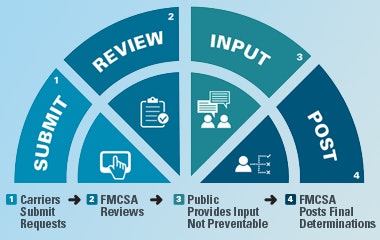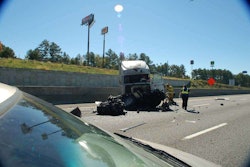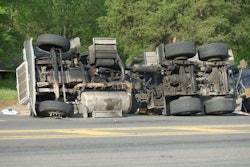 FMCSA has issued clarification to how owner-operators can submit crash preventability review requests to potentially have a preventable ruling overturned and have the crash removed from the carriers’ CSA score.
FMCSA has issued clarification to how owner-operators can submit crash preventability review requests to potentially have a preventable ruling overturned and have the crash removed from the carriers’ CSA score.The Federal Motor Carrier Safety Administration has issued further guidance to clarify how owner-operators and other carriers can dispute certain crashes initially ruled preventable and have them removed from their Compliance, Safety, Accountability scores.
The agency’s Crash Preventability Demonstration Program, a pilot program that launched in August that allows carriers to send crash review requests through the DataQs system, hasn’t had the smoothest launch, says FMCSA.
In a Federal Register notice published Wednesday, Feb. 7, the agency says some submitters have entered crashes under the standard review program in DataQs rather than the crash preventability program. The notice states carriers who submit crashes with the selection of “Not an FMCSA-reportable crash” will have the request closed without a preventability determination. For the crash preventability program, carriers need to select “Crash could not be prevented,” ensure that the crash occurred after June 1, 2017, and select an eligible crash type.
When the program was announced in July, FMCSA said the following crash types are eligible for review during the pilot program:
- When a truck was struck by a driver under the influence or a related offense
- When a truck was struck by a motorist driving in the wrong direction
- When a truck was hit in the rear
- When a truck was hit while legally stopped or parked
- When a pedestrian or car drives in front of a truck in an attempt to commit suicide by truck
- When a truck sustains disabling damage after hitting an animal in the road
- When a crash is caused by an infrastructure failure or falling trees, rocks or other debris
- When a truck is hit by cargo or equipment from another vehicle
In order for a preventability determination to be reversed, carriers are required to submit “compelling evidence that the crash was not preventable,” FMCSA says in its Feb. 7 notice. The agency doesn’t require any specific documentation, so it is up to the carrier to submit any evidence relevant to the crash. FMCSA says it can also request additional information on a crash submission, including proof of a valid CDL and medical certificate.

If a crash is determined after review to still have been preventable, carriers can choose to re-open the request if they have additional documentation that could prove non-preventability.
When reviewing requests, FMCSA can make three determinations: “Preventable,” “Not preventable” or “Undecided.” In the case of an “Undecided” ruling, the agency says the documentation submitted wouldn’t allow for a conclusive decision. A carrier’s SMS rating would include a note that reads, “FMCSA reviewed this crash and could not make a preventability determination based on the evidence provided.”
If a preventable crash ruling is overturned to “Not Preventable,” law enforcement will be able to see a carriers’ Crash Indicator BASIC percentile both with and without the crash, along with a note indicating FMCSA reviewed the crash and determined it was non-preventable. Crashes deemed to be non-preventable during the pilot program will still appear in the CSA SMS, but won’t count against the carrier. FMCSA says it believes it’s important to display all crashes, regardless of the preventability determination, to provide “the most complete information regarding a motor carrier’s safety performance record.”
FMCSA says more than 2,500 requests have been submitted since the pilot program opened on Aug. 1.










